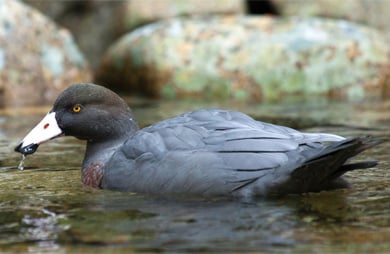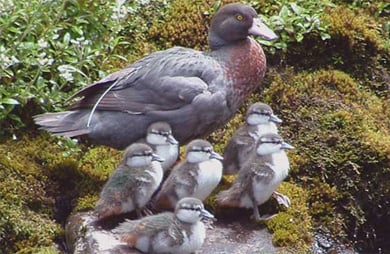Archived content: This media release was accurate on the date of publication.
Date: 23 February 2016
The Minister of Conservation the Hon Maggie Barry will join local iwi, DOC staff and a group of school children known as ‘Whio ambassadors’ to release the whio.
The DOC Operations Team supported by the Central North Island Blue Duck Trust and Whio Forever have worked tirelessly on re-establishing a self-sustaining whio population in Egmont National Park.
The local population on Mount Taranaki was functionally extinct by 1945 due to stoats and rats. “Without stoat trapping, chick survival would be nil and nesting females, moulting birds and naive captive released birds would be vulnerable”, said Biodiversity Ranger Joe Carson.
The predator programme in the park covers 7,500 ha, using 1,160 double-set DOC200 traps to provide adequate protection for breeding whio. Traps are checked by DOC rangers and dedicated volunteers fortnightly over the peak breeding months when ducklings are most vulnerable.
The first successful breeding was recorded in 2005 after a trapping programme began in 2003. The population was reintroduced using birds reared in captivity, boosted by WHIONE (Whio Operation Nest Egg) and the survival of wild chicks from successful breeding seasons.
From extinction in the 1990s there are currently 33 confirmed pairs on the monitored rivers and a census conducted in 2015 using dog teams counted a total of 86 birds.

Whio
Image: © Sabine Bernert

Whio with chicks
Image: © Sabine Bernert
So far this season 29 ducklings have been located and DOC staff, iwi and local whio ambassadors look forward to these numbers increasing.
Genesis Energy and DOC have partnered together in a five year programme to secure the future of this unique vulnerable native bird. Operating under the name of Whio Forever this partnership is fast tracking implementation of the national Whio Recovery Plan to protect whio and increase public awareness
The support of Genesis Energy is enabling DOC to double the number of fully secure whio breeding sites throughout the country, boost pest control efforts and enhance productivity and survival for these rare native ducks.
Background information
Whio
- The whio is a threatened species of native duck that is only found in New Zealand’s fast flowing waters. Featured on New Zealand’s $10 note and with an estimated nationwide population of less than 2,500 birds, whio are rarer than kiwi.
- Whio are adapted to live on fast-flowing rivers so finding whio means you will also find clean, fast-flowing water with a good supply of underwater insects.
- This makes whio important indicators of ecosystem health – they only exist where there is high quality clean and healthy waterways.
Whio Forever
- Genesis Energy has a strong historic association with whio through the Tongariro Power Scheme and in 2010 this association grew through the establishment of Whio Awareness Month (March).
- Today, Genesis Energy and DOC continue their partnership through the Whio Forever Programme, which aims to secure the future of whio in the wild and ensure New Zealanders understand and value of whio in our rivers.
- The support of Genesis Energy and the work of DOC has enabled the Whio Recovery Plan to be implemented.
Conservation issue
- The whio are eaten by stoats, ferrets and cats, with the largest impact during nesting time when eggs, young and females are vulnerable, and also when females are in moult and can’t fly.
- Extensive trapping can manage these predators and work in key whio habitats by DOC and Genesis Energy on the Whio Forever project has already seen an increase in whio numbers.
- Whio cannot be moved to predator-free islands like other species because of their reliance on large fast-flowing rivers.
- Pairs occupy approximately 1 km of water – so they need a lot of river to sustain a large population and they fiercely defend their territories, which makes it difficult to put them with other ducks in captivity.
- They are susceptible to flood events which, destroy nests, fragment broods and wash away their valued food source.
Contact
Donna Worthy, Ranger, Services (Biodiversity)
Phone: +64 6 759 0350
Email: dworthy@doc.govt.nz
Robyn Orchard, national advocacy for Whio Forever
Phone: +64 274 761 769
Email: rorchard@doc.govt.nz